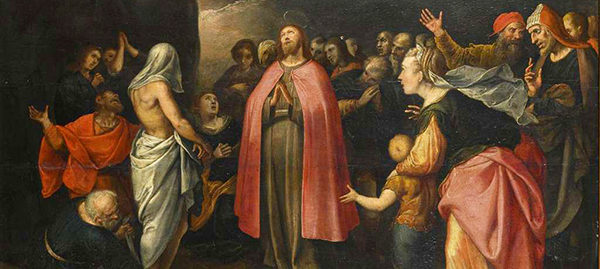
V/ I will turn to you O God,
R/ to God who gives joy to my youth
V/ Give me the Wisdom that sits by your throne;
R/ that I may be counted among your children
Lord, in your all-providential plan, you have led me to this moment to rediscover me in your Word and Wisdom. Aid me to make this time of meditation and prayer enriching, transforming, and liberating for my well-being and others. Amen!
THE NARCOTICS OF COMFORTABLE STATUS QUO
By Dr. Emmanuel Johnson Ibuot
26th Sunday in Ordinary Time, Year C
Amos 6: 1, 4-7; Psalm 145: 6-10; 1 Timothy 6: 11-16; Luke 16: 19-31
Sunday 28th September 2025
The liturgy for the 26th Sunday in Ordinary Time presents a stark and uncomfortable truth: a great chasm can form between ourselves and God, not necessarily through overt malice, but through the narcotic of comfort. The readings today diagnose a spiritual ailment of our time and all times—a deafness to the word of God and a blindness to the suffering of our neighbour, induced by a life of calculated ease and material satisfaction.
The Prophet Amos and the Gospel of Luke speak with a unified, resounding voice against those “at ease in Zion.” Amos condemns the leaders of Israel who, comfortable on their “beds of ivory,” have become “uninterested in the safety of their land,” ignoring the “ruin of Joseph.” This is not merely a political failure but a spiritual one, rooted in pride and a distortion of justice. The Rich Man in Luke’s Gospel gives this complacency a face. “Clothed in purple and fine linen,” he isn’t depicted as actively cruel to Lazarus, the poor man at his gate; he is simply indifferent. Lazarus is invisible to him, less real than the dogs that lick his sores. This damning indifference is the heart of the sin. The chasm that separates them in the afterlife is not a sudden divine punishment, but the terrible, eternal confirmation of a distance the Rich Man himself created on earth through his self-imposed blindness.
How does one fall into such a state? First, there is a conscious choice to prioritize personal satisfaction over our baptismal commitment to others. Then the bane of “prosperity gospel” is that one comes to love the gifts of God more than the Giver, finding security in the “spiritual sweets” rather than in God Himself. This spiritual gluttony makes one incapable of seeing Christ in the suffering at the gate, and the fringes of our society because all senses are turned inward, feasting on self-satisfaction. Even in torment, the Rich Man’s blindness persists; he still sees Lazarus not as a brother, but as a utility, an instrument to serve his needs.
The path away from this perilous comfort is one of active pursuit and profound humility. St. Paul’s exhortation to Timothy to “pursue righteousness, godliness, faith, love, steadfastness, gentleness” is the antidote. God desires that we truly know him as both just and merciful, preferring mercy to insensitivity and wickedness, truth to intentional error or distortion of the truth, and developing a close bond with the Lord himself by daily personal spiritual reading and prayers. This requires a radical faith, a willingness to be continually challenged and transformed by the Word.
St. Teresa teaches that “to be humble is to walk in truth.” It is the rejection of the pride that fueled the injustices in Amos’s time. St. Elizabeth of the Trinity goes further, stating, “to be plunged into humility is to be plunged into God.” This is the very opposite of the Rich Man’s life. He was plunged into comfort, and thus exiled from God. Lazarus, stripped of everything, had nothing left but trust. His prayer is that of the Psalmist who, feeling oppressed, hungry, and imprisoned, still cries out in naked faith, “My soul, give praise to the LORD.”
Ultimately, the readings call us to rely not on signs—”neither will they be convinced if someone should rise from the dead”—but on the quiet, persistent call of God found in scripture and in the person of the poor. God’s mercy, as the opening prayer of the liturgy reminds us, is His greatest power. This is not a sentimental mercy that papers over our faults, but a transformative, purifying love that mercifully strips us of our blinding attachments. It invites us to leave our sumptuous feasts and choose a holy poverty, so that we may finally see the Lazarus at our gate and, in him, find the God who alone can fill the chasm of our hearts.
Daily Offering
Lord, I offer myself to you anew, by taking to heart your Word and Wisdom communicated through this time of meditation. May I be transformed into a prayer presence in the World. Amen
Questions for reflection:
• In what areas of my life might my own comfort or “calculated ease” be preventing me from truly seeing and responding to the needs of others in my family, workplace, or community?
• Where in my own life do I notice a tendency towards indifference? Because I did not allow myself to be affected by the suffering of another?
• In what practical ways can I practice a humility that strips away my attachments and “plunges me into God”?
Suggested Exercise for the Week:
Seek concrete steps you can take this week to step out of your own “sumptuous feast” and actively see and serve the Christ who is present in the poor and marginalized.
Commit to Heart: Let me be your servant
